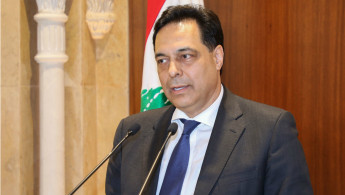He rejected suggestions that the support his nomination received from Shia militant group Hezbollah, which is blacklisted as a terrorist organisation by Washington, would hinder the disbursement of much-needed Western aid.
"The goal is to form a government of independent technocrats," Diab, a former education minister who is also a vice president at Lebanon's prestigious American University of Beirut, told Deutsche Welle.
"Everyone is willing to cooperate so that Lebanon can have an exceptional government that is not like its predecessors in the number of technocrats and women included," he said.
"I think the Americans, when such a government is formed, will lend support because it is a government that aims to rescue Lebanon."
According to the sectarian-based power-sharing system that has prevailed since the end of the 1975-1990 civil war, the position of prime minister is held by a member of the Sunni Muslim community.
Saad Hariri had been tipped in recent days to return to his job, seven weeks after an unprecedented wave of protests condemning corruption and sectarianism forced him out.
But the 49-year-old two-time premier bowed out on Wednesday, claiming that his political rivals were opposed to a technocrat-dominated government that he planned to form.
His party stopped short of throwing its weight behind Diab, who was endorsed by Hezbollah and its political allies.
The move raised fears that a government lacking the support of all of Lebanon's factions could struggle to secure desperately needed foreign support to rescue an economy that is teetering on the brink of bankruptcy.
"It is silly" to argue the upcoming government will be Hezbollah-dominated, Diab told Deutsche Welle.
"This government will carry the face of Lebanon, and will not be the government of one political faction only," he said. "I expect full support from Europe and the US."
Diab held a meeting with Hariri on Friday, hours after demonstrators - many of them Hariri supporters - took to the streets to voice their displeasure at Diab's nomination.
The incoming premier's interview with the German broadcaster came as the US undersecretary of state for political affairs, David Hale, was in Lebanon for meetings with top officials.
Follow us on Twitter and Instagram to stay connected





 Follow the Middle East's top stories in English at The New Arab on Google News
Follow the Middle East's top stories in English at The New Arab on Google News
![Israeli forces ordered bombed Gaza's Jabalia, ordering residents to leave [Getty]](/sites/default/files/styles/image_330x185/public/2176418030.jpeg?h=a5f2f23a&itok=_YGZaP1z)

